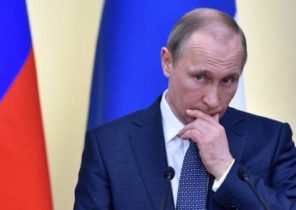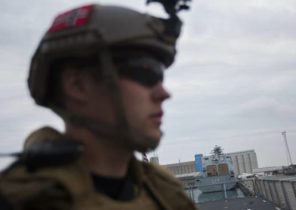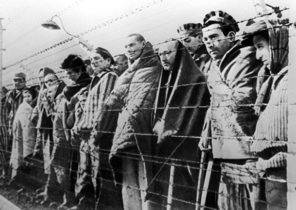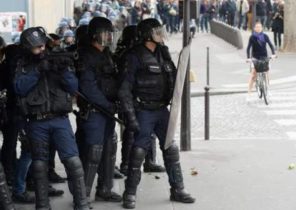According to the first version which is in Vogue since the days of Khrushchev, Stalin did not attach importance to reports of scouts, considering it a disinformation and provocation. Therefore, at the time of the attack of the Germans the Red army was not ready for it.
A few days ago in the “Russian newspaper” published an article of Director of the foreign intelligence Service of the Russian Federation Sergei Naryshkin, in which he described how the head of the Soviet intelligence Paul Phytin presented 17 June 1941, Stalin report that the attack of Nazi Germany on the Soviet Union expected in the coming days. But Stalin, according to Naryshkin, brushed aside that warning: “Misinformation! Can be free!”.
According to the second version, which is shared by many defenders of the Soviet leader, he had reason not to trust intelligence, as it is before reported different dates of attack, but they were not confirmed.
And how was actually?
Hit first loses
First, a few key dates and motive forces of the story.
On 18 December 1940 Hitler signed the “plan Barbarossa” on the preparation of the attack on the USSR. It established deadlines for readiness for this attack — may 15, 1941 (not the date of the attack, namely the deadline for the training of troops) and said that the attack on Russia need to win over England, defeating the Red Army in several lightning-fast battles (the concept known as “blitzkrieg”).
And only on 30 April 1941, the führer has determined the date of the attack — June 22. The order about it was launched to the troops later on June 10. And it was the chance to abort or postpone the date until June 18.
In other words, the exact date of the attack came from the German high command only at the end of April. In parallel, Hitler demanded to keep the date strictly secret and to organize a campaign of disinformation of the Soviet Union.
Why was the misinformation? Besides the obvious reasons of surprise, which would give the advantage to the offensive, there was another.
Date, which “throws” the Germans were significantly ahead of the real date of occurrence. What, at first glance, the Germans were not profitable. After all, the enemy somehow mobilized and will wait for the impact. And in any case will be much closely monitor the movements of enemy troops on its borders.
However, the goal of the Fuhrer could be different to make USSR or attack, or, more likely, to declare a General mobilization in response to a false message about the war.
This, in turn, would give the Germans a legitimate reason to make a preemptive strike and full mobilization equated to a Declaration of war. In this case, the Soviet Union looked to the aggressor. Which automatically meant that the war the USSR should declare Japan — an ally of Germany, the associated defensive Pact.
That is, Stalin would have been forced then to fight on two fronts. He of course understood and didn’t want to give the Japanese a reason to declare war — especially those without a reason to attack and they themselves did not seek, going to start to deal with the Pacific possessions of the United States and “digest” the vast China (at least this information came from spy Richard Sorge).
In addition, the charge of aggression would deprive the Soviet Union of the support of other countries.
It was a very important point — if first attacked by Germany, the Soviet Union automatically becomes an ally of England, and later in the United States, whose entry into the war was a matter of time. And let in reality, the allies began seriously to help only in 1944, but part of the forces of the Nazis they were distracted, but at the same time was the delivery of lend-lease, which had expedited the victory over the Nazis.
Hitler, attacked first, got not just a war on two fronts, and the repetition of the history of the First world war, when the German Empire was at war with the Entente, a coalition between the West and Russia. It is strategically disastrous combination, whatever the tactical success achieved by the Germans.
Therefore, the critical attitude of Stalin to the intelligence reports actually took place. But it was due to fear of misinformation, which pushes the country into war on the most disadvantageous foreign policy scenario. And not because of any special “trust” to Hitler, who after the collapse of the Soviet Union, some researchers began to ascribe to the Soviet leader.
In the same context that we must examine the famous statement of TASS of 13 June 1941, which refuted the “rumors spread in the British press” about the impending German attack on the Soviet Union. Thus, Stalin again made it clear that the Soviet Union does not want war.
A reference to the British press was also not accidental — in the Kremlin do not exclude that the similar message London wants to encourage the USSR to start a war against Germany that she refused the plans for the attack on the island.
As the USSR was preparing for war
Although Stalin and all the Soviet leadership, of course, understood the inevitability of war with Germany after the defeat of France. That is, since June of 1940. The question was only, whether the attack the Germans in the Soviet Union before operation landing in Britain or after.
13 may — that is already two weeks after the decision of Hitler to attack on June 22 — the Soviet General staff issued the first Directive on the transfer of troops from East to West of the country. And even earlier, in April began covert mobilization which allowed the beginning of June to complete the army of almost a million soldiers.
It was done clearly at the bidding of Stalin, who on may 5, speaking to graduates of military academies, said that the need to prepare for war with the Germans, given the lessons of the defeat of France.
Created a new combined-arms army in the Ukraine, Belorussia, the Crimea (he was part of the RSFSR). In General, across the border from the South, West and North.
The quality of these troops is a separate issue. Something the Red Army was superior to other armies of the time, something inferior. But when it comes to the Wehrmacht, that is at the time of 1941 was the best armed forces in the world. Were almost three years ‘ experience victorious wars throughout Europe.
Apparently, this was the reason why Hitler was confident in the defeat of the red Army under all conditions (although, as the future showed, he vastly underestimated the military potential of the Union).
But back to the military preparations of the USSR. They show that the war with Hitler, Stalin was prepared. Not at all, and in the near future.
June 18 — that is, immediately after the said Naryshkin report of Phytin Stalin — border section began at night to withdraw from the barracks and winter quarters in areas of concentration. Where they began to dig and camouflage.
But with all this, directly understanding of what the war is about to begin, it is only late in the evening of 21 June, when the border began to talk about the preparation of German troops to attack, and reported a deserter.
About this Zhukov reported to Stalin and 22 June, at 0:30 in the morning, the Directive on full alert left the troops of border districts. But the Directive came directly to the part after 2-3 hours, that is, on the eve of the invasion, and has little impact on that.
In particular, do not have the time to conduct the dispersal of aircraft and most of the Soviet aviation in the West of the USSR was destroyed right on the ground.
That is a blow, despite all the preparation was for the Soviet troops sudden that, in many respects, has predetermined defeat of the first months of the war.
So you should come back to the question — whether to give intelligence to Stalin is clear evidence of the beginning of the German offensive?
That brought intelligence to Stalin
Let’s start, actually, with the plan “Barbarossa”. It is believed the General opinion that this plan almost immediately after the signing laid on the table of Stalin. But it’s not.
In December 1940, from an agent in Germany who had served in the Ministry of foreign Affairs of the Third Reich, it was reported that Hitler ordered to prepare for war, which could begin in March. Moreover, as a prerequisite to start a war, voiced the victory over England.
Although, as we already know from published after the war plan “Barbarossa”, Hitler insisted on the attack against the Soviet Union, without waiting for victory over the British, who “locked” on the island.
That is, on the one hand, Soviet intelligence claimed a sensational confirmation that there is a plan to attack (but not the plan itself, but only the fact of its existence).
On the other — the attack on Russia in March after the condition is winning over Britain — turned out to have nothing to do with reality. And it is possible that was misinformation from the Germans.
In early may, followed by another might report. The Soviet naval attache in Berlin, citing his agent said that the war will begin on 14 may blow through Finland, the Baltic States and Romania.
Submitted to Stalin a report of the head of the Navy Admiral Kuznetsov made a note that this is likely false information with the aim to test the reaction of the Soviet Union. The war eventually began much later and with a different direction of the main blow — through Belarus.
As we remember, the date June 22, Hitler had already approved. Therefore, the data from the attache was also likely to be “misinformation”.
Didn’t mention the date and the legendary Richard Sorge, who was awarded accurate prediction of the start of the war (which later turned out to be a historical forgery). In fact, this scout, who worked for the German attache in Tokyo, we’re finding a lot of puzzling messages.
On 2 may he reported to the Kremlin that the decision on war be made by Hitler or this month, or after the victory over the British. As we have seen from the above data, it could not be true: the Fuhrer has set the date for the attack in April, and even earlier said that the attack on the Soviet Union, without waiting for victory over Britain.
Sorge referred to the German Ambassador in Japan, which the day before spoke. That is, it was not documented fact, but personal opinion is far from Europe, the German diplomat.
May 19, Sorge reported that the war could begin at the end of may, but it is likely that this year to fight the Germans do not want to. Rather contradictory data on the basis of which it is difficult to take any decision.
More or less close to the truth report of a scout sent on may 30 — he said that the war will begin in the second half of June. The day after he was named the date — June 15. But that day war did not happen. And Sorge sent the message that the attack is delayed to the end of the month.
Finally, two days before the attacks of the Germans, Richard sends the message that “war is inevitable” — without specifying dates.
However, Sorge has indeed made an invaluable contribution into the assessment of the intentions of Germany and Japan to join the war against the Soviet Union. Based on his reports, the Soviet leadership was able to transfer the forces from the Far East to the West.
Not less about dates was produced, and “the Red chapel” — the anti-fascist network, which operated across Europe. In early March, she reported that the Germans attacked in the spring. Then the war was “appointed” on April 15. Then on may 20.
After a wave of false reports was followed by several true. “Chapel” on 11 June reported that the question of the attack on the Soviet Union decided — without further specifics. This report came exactly the next day after the order to attack on June 22 left in the German army.
17 Jun Capella reports that the military preparations of the Germans over and attack can be expected at any time (recall that boundary date preparation to strike the Wehrmacht identified 18 June). It is a report to Stalin with the words scout Zoe Rybkina called “disinformation” (which results in his article the head of the foreign intelligence service of Russia Naryshkin).
Unknown, said Li Secretary General, these words — the Zoya Rybkina their witness was not. However, given that the group of scouts from the “red chapel” has several times made a mistake with the dates of the attack, it is possible that Stalin was skeptical to the new “final date”.
Although, maybe not skeptical. As we showed above, already on 18 June the troops of the special Directive of the General staff began to take on the position. That is, the next day after the message of the “red chapel” was laid on the table the leader.
It should be said that many false reports do not say that the intelligence was bad. The agents performed his task, conveyed that he had heard from the Germans themselves in private conversations. It is an integral part of the profession.
The question was rather to the analysts of the Center and the military, which had to match this information with data already reconnaissance. Which, incidentally, is regularly informed about the concentration of German troops on the Soviet border. But was not able to accurately specify any number of enemy divisions, or the direction of the main blow of the German troops.
The start date of the war a day earlier or later — were important at the time much less than the knowledge of where it will hit the enemy. Alas, it became known too late — a few hours before the attack.
But reports of alleged attacks was very much — and here we have quoted only a small part. Basically, the reports contain conflicting dates, including “22 June”, by the way, has not sounded never.
Or rather, sounded, but just at the last day — 21 June, when little could be changed.
According to another version, Stalin tracked indirect evidence of preparations for the attack on the Soviet Union. For example — the purchase of sheepskin and other preparations for a winter campaign. The Kremlin could not imagine that pedantic Germans were so cocky that he expected to finish a great military campaign before the onset of cold weather, and therefore began the invasion, unprepared for winter.
The direction of the main blow
But back to why Stalin and the army command did not know where it will hit Hitler. And this had led to a severe defeat of the red Army early in the war and the first “boilers”.
Hitler at the stage of preparation for the offensive stated that the North and South Tips well fortified, and it is necessary to beat in the West that is in the area of Belarus where Germans have numerical and technical superiority.
Of course, to hide this area, run many “disinformation” — as in the case with a report about the attacks through Finland and Romania.
It is known that in the Soviet General staff in the 30’s knew that the Belarusian track — the shortest way to Moscow. And military exercises are often played this scenario the attack.
It was planned that if the Germans will hit hardest here, the counterattack will follow to the South, from Ukraine, to turn North and cut off the advancing German group.
However, miscalculations in the organization of troops and the surprise attack allowed the Germans to hide their plans and apply the most painful defeat in the area of responsibility of the Western military district. For what its commander General Pavlov was subsequently shot.
Was it the fault determining factor in the defeat of the first days of the war, historians still argue.
But it is known more — high mobility of the German army, its air superiority and advanced tactics of deep tank covers hardly ever been surmountable to all armies of the time. Showed example of the fall of the powerful countries in Europe — France. And Britain saved from defeat only withdraws its troops to the island.
The Soviet army tried to take into account the experience of the French defeat (it said Stalin) but as you can see, not managed to solve this problem, neither tactically nor technically. And, apparently, any General would wait for the fate of Pavlov, if the Wehrmacht attacked the main forces in his area. And here already a question not to trust Stalin exploration, and how he managed to re-equip and prepare the army for war a new type. Judging by the debacle that the Soviet Union suffered from the Germans in the first days of the war, — not yet and not prepared.
However, you need to understand that the intelligence of the Germans is also very much lost in the war.
As recognized by the German generals (in particular, Halder), they underestimated the Soviet military and industrial potential. Talked about this at the end of the war and Hitler himself.
But the attack on the Soviet Union, he was guided by his intelligence, which drew the USSR a “colossus with feet of clay”. Hitler later assumed that it was deliberate misinformation entrenched in the Abwehr of British agent, which provoked him to attack Russia and get bogged down in it, instead of having to first deal with the British.
But in the case of the USSR a major role in the initial defeat was not so much a distrust of Stalin to the exploration (although, of course, too late, the order on bringing troops to combat readiness played a significant role in the defeats of the first days), but the clear superiority of the German war machine in 1941.
However, the Soviet Union, in contrast to France, managed to survive after a powerful blow of the Wehrmacht and to thwart the plan “Barbarossa”, according to which by the end of summer the German troops had to leave on a line Arkhangelsk-Astrakhan. By this time the German offensive had already faced with increasing resistance of the Soviet troops and the original plan collapsed. And in late 1941 the Nazis were defeated near Moscow.






